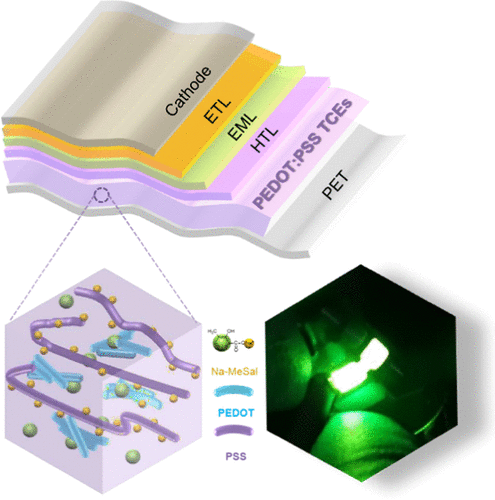当前位置:
X-MOL 学术
›
ACS Appl. Mater. Interfaces
›
论文详情
Our official English website, www.x-mol.net, welcomes your feedback! (Note: you will need to create a separate account there.)
Conductivity and Stability Enhancement of PEDOT:PSS Electrodes via Facile Doping of Sodium 3-Methylsalicylate for Highly Efficient Flexible Organic Light-Emitting Diodes
ACS Applied Materials & Interfaces ( IF 8.3 ) Pub Date : 2021-12-30 , DOI: 10.1021/acsami.1c21591 Lihui Liu 1 , Lei Wu 1 , Hao Yang 1 , Honggang Ge 1 , Juxuan Xie 1 , Kun Cao 1 , Gang Cheng 2, 3 , Shufen Chen 1
ACS Applied Materials & Interfaces ( IF 8.3 ) Pub Date : 2021-12-30 , DOI: 10.1021/acsami.1c21591 Lihui Liu 1 , Lei Wu 1 , Hao Yang 1 , Honggang Ge 1 , Juxuan Xie 1 , Kun Cao 1 , Gang Cheng 2, 3 , Shufen Chen 1
Affiliation

|
Poly(3,4-ethylenedioxythiophene):poly(styrenesulfonate) (PEDOT:PSS) is one of the most prospering transparent conductive materials for flexible optoelectronic devices, which arises from its nonpareil features of low-cost solution processability, tunable conductivity, high transparency, and superior mechanical flexibility. However, acidity and hygroscopicity of PSS chains cause a decrease in conductivity, substrate corrosion, and device degradation. This work proposes a facile and effective direct doping strategy of sodium 3-methylsalicylate to enhance the conductivity, alleviate the acidity, and improve the stability of PEDOT:PSS electrodes, simultaneously. Owing to the formation of weaker acid and PSS-Na, PSS chains are disentangled from the coiled PEDOT:PSS complexes, leading to the phase separation of PEDOT:PSS and the formation of fibril-like PEDOT domains. Eventually, the sodium 3-methylsalicylate-modified PEDOT:PSS electrode is employed in flexible organic light-emitting diodes with an outstanding external quantum efficiency of up to 25%. The improved performance is attributed to the more matched work function and the as-formed interfacial dipole. The sodium 3-methylsalicylate-modified PEDOT:PSS electrode with high conductivity and transmittance, superior stability in the air as well as good mechanical flexibility has the potential to be the most promising transparent conductive material for flexible optoelectronic device applications.
中文翻译:

通过简单掺杂 3-甲基水杨酸钠提高 PEDOT:PSS 电极的电导率和稳定性,用于高效柔性有机发光二极管
聚(3,4-乙烯二氧噻吩):聚(苯乙烯磺酸盐)(PEDOT:PSS)是柔性光电器件中最繁荣的透明导电材料之一,它具有低成本溶液可加工性、可调电导率、高透明度等无与伦比的特性,和优越的机械柔韧性。然而,PSS 链的酸性和吸湿性会导致电导率下降、基板腐蚀和器件退化。本工作提出了一种简便有效的直接掺杂 3-甲基水杨酸钠的策略,可同时提高 PEDOT:PSS 电极的导电性、缓解酸性并提高稳定性。由于形成较弱的酸和 PSS-Na,PSS 链从盘绕的 PEDOT:PSS 配合物中解开,导致 PEDOT 的相分离:PSS 和原纤维样 PEDOT 结构域的形成。最终,3-甲基水杨酸钠修饰的 PEDOT:PSS 电极被用于柔性有机发光二极管,其外量子效率高达 25%。改进的性能归因于更匹配的功函数和形成的界面偶极子。3-甲基水杨酸钠改性的 PEDOT:PSS 电极具有高导电性和透射率、在空气中的优异稳定性以及良好的机械柔韧性,有可能成为柔性光电器件应用中最有前途的透明导电材料。改进的性能归因于更匹配的功函数和形成的界面偶极子。3-甲基水杨酸钠改性的 PEDOT:PSS 电极具有高导电性和透射率、在空气中的优异稳定性以及良好的机械柔韧性,有可能成为柔性光电器件应用中最有前途的透明导电材料。改进的性能归因于更匹配的功函数和形成的界面偶极子。3-甲基水杨酸钠改性的 PEDOT:PSS 电极具有高导电性和透射率、在空气中的优异稳定性以及良好的机械柔韧性,有可能成为柔性光电器件应用中最有前途的透明导电材料。
更新日期:2022-01-12
中文翻译:

通过简单掺杂 3-甲基水杨酸钠提高 PEDOT:PSS 电极的电导率和稳定性,用于高效柔性有机发光二极管
聚(3,4-乙烯二氧噻吩):聚(苯乙烯磺酸盐)(PEDOT:PSS)是柔性光电器件中最繁荣的透明导电材料之一,它具有低成本溶液可加工性、可调电导率、高透明度等无与伦比的特性,和优越的机械柔韧性。然而,PSS 链的酸性和吸湿性会导致电导率下降、基板腐蚀和器件退化。本工作提出了一种简便有效的直接掺杂 3-甲基水杨酸钠的策略,可同时提高 PEDOT:PSS 电极的导电性、缓解酸性并提高稳定性。由于形成较弱的酸和 PSS-Na,PSS 链从盘绕的 PEDOT:PSS 配合物中解开,导致 PEDOT 的相分离:PSS 和原纤维样 PEDOT 结构域的形成。最终,3-甲基水杨酸钠修饰的 PEDOT:PSS 电极被用于柔性有机发光二极管,其外量子效率高达 25%。改进的性能归因于更匹配的功函数和形成的界面偶极子。3-甲基水杨酸钠改性的 PEDOT:PSS 电极具有高导电性和透射率、在空气中的优异稳定性以及良好的机械柔韧性,有可能成为柔性光电器件应用中最有前途的透明导电材料。改进的性能归因于更匹配的功函数和形成的界面偶极子。3-甲基水杨酸钠改性的 PEDOT:PSS 电极具有高导电性和透射率、在空气中的优异稳定性以及良好的机械柔韧性,有可能成为柔性光电器件应用中最有前途的透明导电材料。改进的性能归因于更匹配的功函数和形成的界面偶极子。3-甲基水杨酸钠改性的 PEDOT:PSS 电极具有高导电性和透射率、在空气中的优异稳定性以及良好的机械柔韧性,有可能成为柔性光电器件应用中最有前途的透明导电材料。










































 京公网安备 11010802027423号
京公网安备 11010802027423号